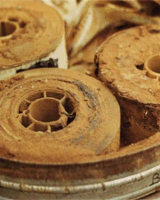27 October Declared World Day for Audiovisual Heritage
27-10-2007 (Paris)

Vinegar effects on film material
© Austrian Film Archives
In cooperation with the Co-ordinating Council of Audiovisual Archives Associations (CCAAA) and other partners, UNESCO is leading the fight to preserve the world’s fragile audiovisual heritage. It has adopted 27 October as the World Day for Audiovisual Heritage as a means of focusing global attention on the issues at stake.
A number of archives around the world will be commemorating this Day with a series of activities also designed to raise awareness of the fragility and vulnerability of this heritage.
Film, television and radio are the canvas of modern life as they narrate some of the most indelible memories of our times. Who can forget the television coverage of the events unfolding on 11 September 2001? The harrowing devastation of the tsunami of 26 December 2004? Images of survivors of genocidal wars of the 20th century?
Audiovisual documents portray our common heritage whether this is in the form of daily news broadcasts; advertisements for popular but passing fads; or more symbolic events that are representative of the cultural identity of a people.
But while some of the more major events have been preserved, there is no guarantee that in 50 years time any of these will be accessible. The first moonwalk took place on 20 July 1969, less than 40 years ago, but the original recording cannot be located and is presumed lost. How many other countless treasures have disappeared over the years?
All of the world's audiovisual heritage of the last century is endangered; most of it is considered lost. Not even in those countries where funds are more easily available can it be assumed that this heritage is protected. Floods and fires, storms and earthquakes can destroy our heritage overnight. Humidity, heat, dust and salt-laden atmospheres also play their part, and losses can arise from technical obsolescence as well as physical decay affecting not only traditional carriers but also the 'new' digital media. Theft and vandalism, the ravages of war, deliberate erasing and reusing of tapes have destroyed countless collections.
Safeguarding audiovisual heritage is a complex process requiring a range of technical, political, human and financial solutions. Not taking action will result in the loss of entire chapters of this heritage in less than ten years, and lead to impoverishment of the global identity. This World Day is therefore an ideal occasion for everyone to make a conscious collective effort to preserve the av heritage before it is too late.
On this occasion, the Communication and Information Programme of UNESCO created a new webpage dedicated to the World Day for Audiovisual Heritage website.
Film, television and radio are the canvas of modern life as they narrate some of the most indelible memories of our times. Who can forget the television coverage of the events unfolding on 11 September 2001? The harrowing devastation of the tsunami of 26 December 2004? Images of survivors of genocidal wars of the 20th century?
Audiovisual documents portray our common heritage whether this is in the form of daily news broadcasts; advertisements for popular but passing fads; or more symbolic events that are representative of the cultural identity of a people.
But while some of the more major events have been preserved, there is no guarantee that in 50 years time any of these will be accessible. The first moonwalk took place on 20 July 1969, less than 40 years ago, but the original recording cannot be located and is presumed lost. How many other countless treasures have disappeared over the years?
All of the world's audiovisual heritage of the last century is endangered; most of it is considered lost. Not even in those countries where funds are more easily available can it be assumed that this heritage is protected. Floods and fires, storms and earthquakes can destroy our heritage overnight. Humidity, heat, dust and salt-laden atmospheres also play their part, and losses can arise from technical obsolescence as well as physical decay affecting not only traditional carriers but also the 'new' digital media. Theft and vandalism, the ravages of war, deliberate erasing and reusing of tapes have destroyed countless collections.
Safeguarding audiovisual heritage is a complex process requiring a range of technical, political, human and financial solutions. Not taking action will result in the loss of entire chapters of this heritage in less than ten years, and lead to impoverishment of the global identity. This World Day is therefore an ideal occasion for everyone to make a conscious collective effort to preserve the av heritage before it is too late.
On this occasion, the Communication and Information Programme of UNESCO created a new webpage dedicated to the World Day for Audiovisual Heritage website.
Related themes/countries
· World Day for Audiovisual Heritage
· Archives: News Archives 2007
Share this story:
Contact information
- UNESCO
Source















